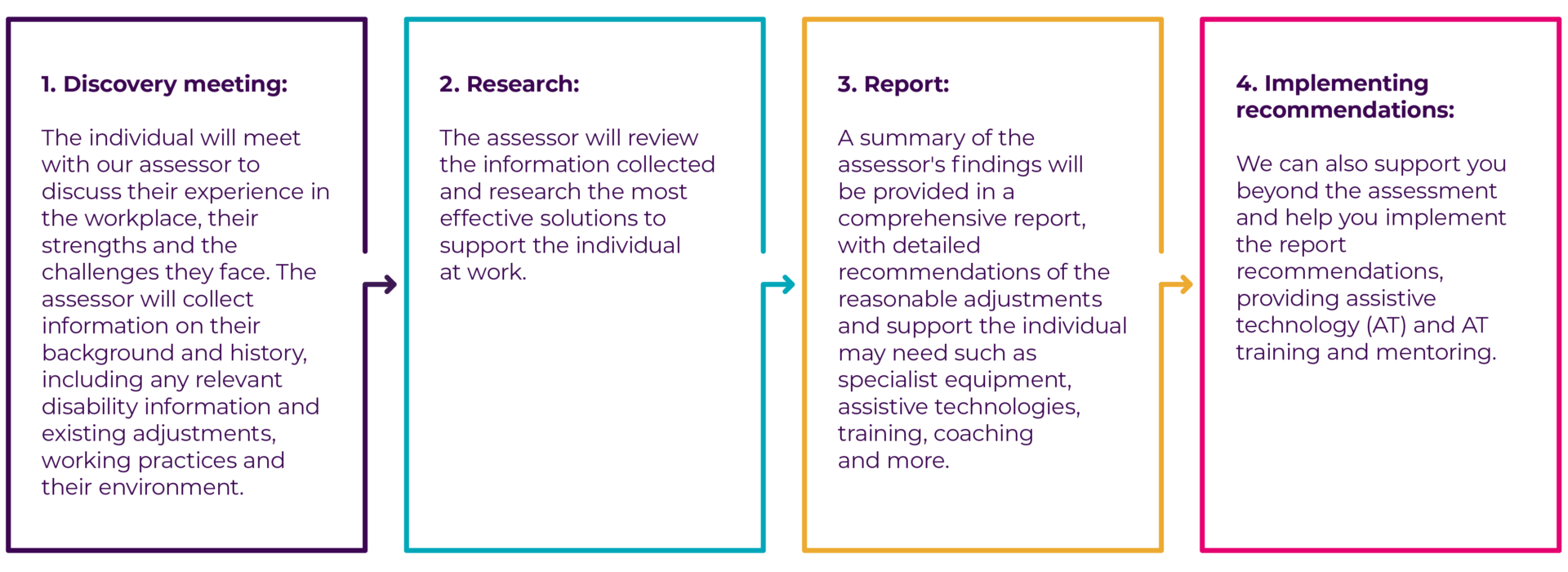Create an accessible and inclusive workplace with our workplace needs assessment service
Workplace or reasonable adjustments are key to creating an accessible working environment where everyone has the tools and support they need. Our workplace needs assessments help you identify and implement support and reasonable adjustments quickly and effectively.
Some people may be hesitant to disclose a disability or come forward and ask for reasonable adjustments, whilst others may be undiagnosed or waiting for a diagnosis. Whatever stage they are at, we can help you identify and support them with the most suitable software, tools and training to access their jobs and do their best work.
Low costs
Most reasonable adjustments cost under £100, whilst many cost nothing at all
Increased productivity
47% said adjustments help them to be more productive and 49% said adjustments help them stay in their job
Expert advice on reasonable adjustments and support
Our experts will assess the needs of your employee(s) and guide you through the workplace needs assessment process.
We will provide you with a comprehensive report, with recommendations on reasonable adjustments to implement. The report breaks down the solutions, providers and costs of each recommendation.
Our assessors are up to date in the latest innovations in assistive technology software, developments in reasonable adjustments and thinking within the disability community. They have expertise and experience in assessing employee needs within the employer’s framework of working.
We can also supply the latest Assistive Technology (AT) equipment and software and provide one-to-one AT training (online or in-person). We can also provide ongoing support throughout their continued learning.
Access to Work fulfilment
Our services can provide an end-to-end bespoke service for all employers and employees. We have expertise in the sourcing, provision and set-up of assistive technology equipment and software including training on that software. We also provide disability awareness training, coaching and skills training, which can sometimes be paid for by the government’s Access to Work scheme.

Experts in diversity and inclusion
Why work with us
We can provide you with the expertise you need to conduct workplace needs assessments and implement the reasonable adjustments and assistive technology your employees need to thrive in the workplace.
- Create an accessible and supportive workplace for all: Provide the right support and tools to create an inclusive workplace and retain existing talent.
- Meet your legal obligations: Under the Equality Act 2010, employers have a legal obligation to ensure disabled employees can access services, education and jobs as a non-disabled person would be able to.
- End-to-end solutions: We offer end-to-end solutions to support your employees with the tools and training they need to thrive at work.
- Expert support: With over 35 years of experience and 400 lived experience consultants, we are uniquely qualified to provide the knowledge and expertise to support your neurodivergent and disabled employees.
- Skip the queue: With long delays on assessments and diagnosis combined with significant wait times for Access to Work clearance, individuals can wait months to get the right support. Don’t delay supporting your team – work with us and get started today.
Whether you have one employee or a group to assess, we can conduct workplace needs assessments to support your teams.
The process

- Discovery meeting: The individual will meet with our assessor to discuss their experience in the workplace, their strengths and the challenges they face. The assessor will collect information on their background and history, including any relevant disability information and existing adjustments, working practices and the environment.
- Research: The assessor will review the information collected and research the most effective solutions to support the individual at work.
- Report: A summary of the assessor’s findings will be provided in a comprehensive report with detailed recommendations of the reasonable adjustments and support the individual may need such as specialist equipment, assistive technologies, training, coaching and more.
- Implementing recommendations: We can also support you beyond the assessment and help you implement the report recommendations, providing assistive technology (AT) and AT training and mentoring.




